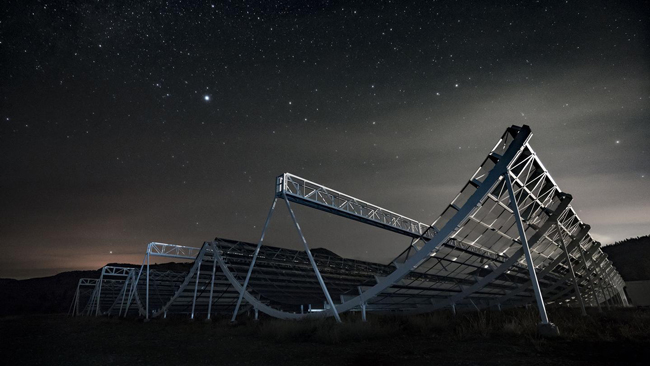
The team behind the celebrated Canadian Hydrogen Intensity Mapping Experiment (CHIME) telescope has won yet another prestigious award. Last week, the Natural Sciences and Engineering Research Council of Canada (NSERC) announced that the approximately 100 people on the CHIME team have won the Brockhouse Canada Prize for Interdisciplinary Research in Science and Engineering, which includes a $250,000 grant.
Traditional telescopes only observe a small region of the sky at any given time. CHIME, however, is a large, stationary radio telescope that uses revolutionary technology to create an unprecedented picture of the overhead sky by collecting detailed data from an enormous instantaneous field of view (roughly 200 square degrees, equivalent to the area covered by more than 1,000 full Moons). The project is a collaboration between scientists from McGill, the University of British Columbia, University of Toronto, Perimeter Institute for Theoretical Physics, and the National Research Council of Canada. CHIME is located in British Columbia’s Okanagan Valley.
Since CHIME first went online in September 2017, the project has made dramatic advancements in the area of fast radio bursts, brief and powerful flashes of radio waves with enigmatic origins. Scientists first discovered FRBs in 2007, but only observed 140 before CHIME began gathering data. In CHIME’s first year of operations alone, the telescope discovered more than 500 new FRBs, and can pinpoint the burst’s position to within a patch of sky roughly equivalent to the size of the full Moon. This past July, the team announced the discovery of a strange and persistent radio signal from a far-off galaxy that appears to repeat every 0.2 seconds in a clear periodic pattern.
The Brockhouse Canada Prize recognizes not only CHIME’s “enormous impact in areas beyond dark energy” and creation of “profound new knowledge about some of the greatest mysteries of our universe,” but also the project’s “progressive training environment for students, post-doctoral fellows and research associates. The team proudly includes members of underrepresented groups in physics.”
The team’s groundbreaking work has been previously recognized with the 2022 Berkeley Prize, the 2020 Governor General’s Innovation Award, and a place on Nature’s list of top discoveries in 2019.
Earlier this year, the project received funding to complete the construction of three new “outrigger” radio telescopes—to be located in British Columbia, West Virginia and California—that will work in conjunction with the main CHIME telesceope, allowing the team to zoom in on an FRB’s location to within an area of the sky roughly equivalent to the size of a quarter held at 40 kilometers.
